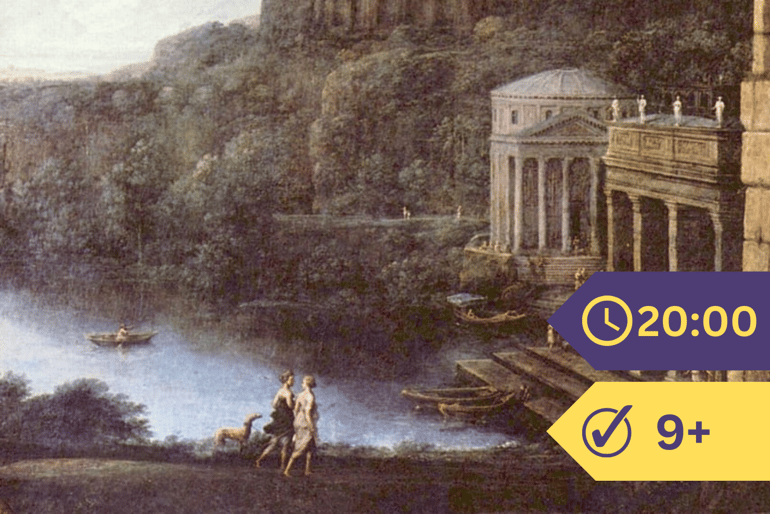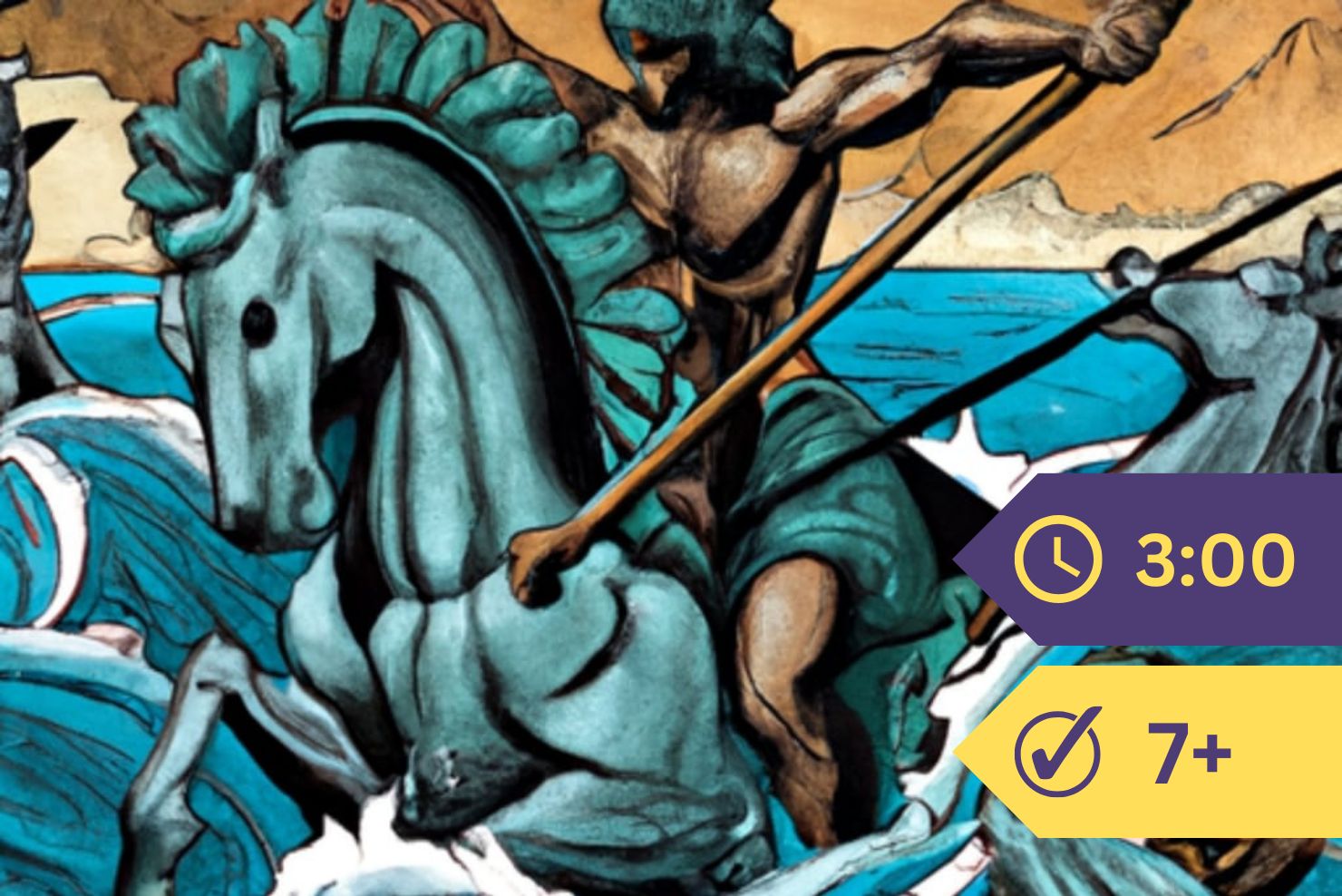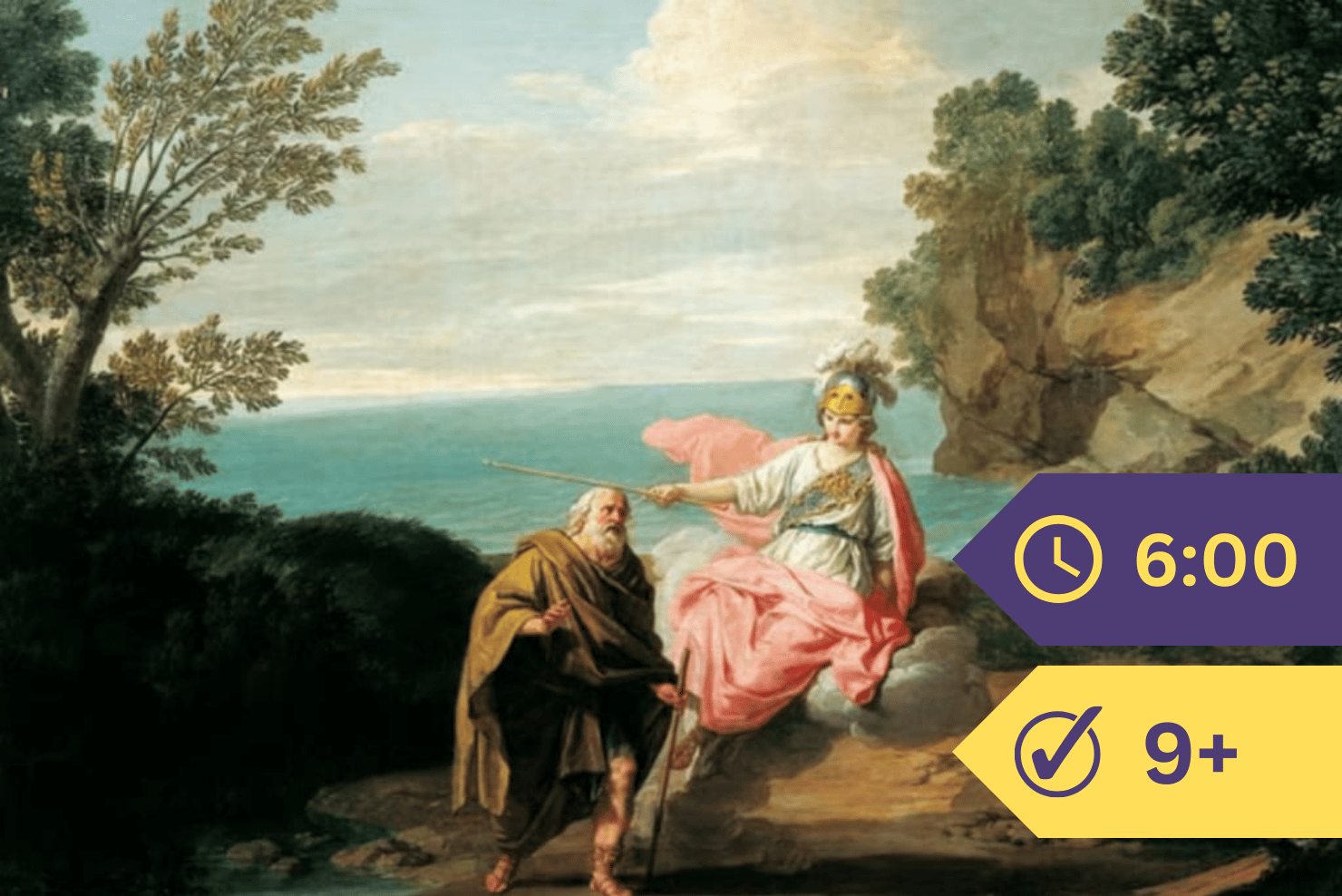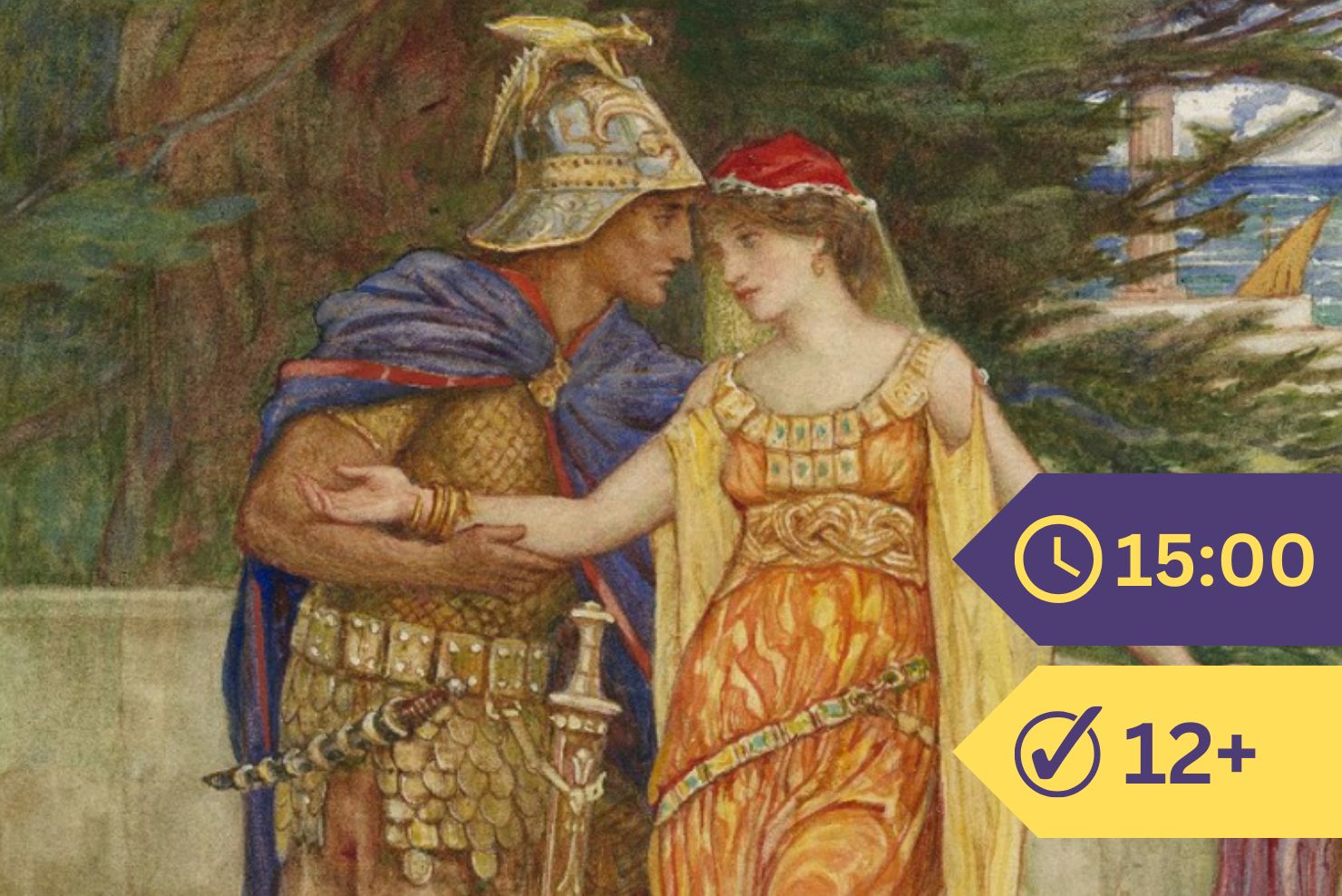Aeneas of Troy, who came to Italy, took Lavinia, the daughter of King Latinus, as his wife. He built a city and named it Lavinium after his wife. Thirty years later, his son Ascanius left Lavinium with many people and built a new city called Alba. For twelve generations, kings of the house and lineage of Aeneas ruled this city. The eleventh in lineage was Procas, who had two sons, Numitor and Amulius. According to custom, Procas left his kingdom to Numitor, his eldest son. But Amulius drove out his brother and ruled in his place. Not content with this wickedness, he also killed all of his brother’s male children. He made his brother’s daughter, Rhea Silvia, a priestess of Vesta, as if to prove her virginity, but in reality, the idea was that the name of his brother would be lost because those who serve Vesta are sworn to eternal virginity.
However, Rhea Silvia gave birth to twin sons, whose father, it was said, was the god Mars. Amulius was furious when he heard this. He let Rhea die of hunger in prison and gave the children to some of his servants, ordering them to throw them into the river. At that time, the Tiber had flooded, and the servants could not get close to the river. However, they did not doubt that the children would perish, although the water was neither deep nor fast. Thinking that they had carried out the king’s orders, they put the babies in the water and left. But after a while, the tide receded, and the basket in which the children had been placed lay on dry ground. A she-wolf, descending from the hill to drink from the river, heard the babies crying and ran to them.
The she-wolf did not devour the children but gave them milk. She was so gentle that Faustulus, the king’s shepherd, who happened to pass by, saw her licking them with her tongue. This shepherd took the children away from the she-wolf and gave them to his wife to raise. When they were old enough to go out on their own, the children were not willing to live with the flocks of sheep. These children were real hunters who roamed the woods. And when they were at full strength, they were not satisfied with killing only wild animals. They also wanted to attack bands of robbers, as they returned loaded with their booty, and the loot would be distributed among the shepherds.

At that time, a festival was held annually on the hill now called the Palatine in honor of the god Pan. King Evander had established this festival for the first time after coming from Arcadia. In that land, which is a land of shepherds, Pan is the god of the shepherds, and he is highly revered. When the young men and their companions (for they had gathered a large group of shepherds around them) were celebrating the festival, robbers approached them who had laid an ambush because they were very angry about the booty they had lost.
These robbers captured Remus, but they could not catch Romulus because he fought so fiercely against them. They handed Remus over to King Amulius and accused him of many things, especially that he and his companions had invaded the land of Numitor and treated them like enemies, taking away much booty.
The king delivered Remus to Numitor to be put to death. Faustulus, the shepherd who had raised Romulus and Remus, knew from the beginning that they were of royal descent. He had found them as infants in the river on the king’s orders. He waited until an opportunity or necessity arose to reveal this information to Romulus. Numitor, who had Remus under his care, also thought about his grandsons. He knew they were twins and the time was right. He saw they were proud and after interrogating Remus, he came close to learning where he came from. Now Romulus was ready to help his brother. He did not dare come openly with his entire group as he was no match for the power of King Amulius. Instead, he commanded various shepherds to go to the palace and set a time when they would meet. Remus also came with a group of young men gathered from Numitor’s household. Romulus and Remus killed King Amulius. Numitor then gathered the youth of Alba to the citadel, shouting that they should make the place safe because the enemy was there. But when he noticed that the young men had already done this deed, he immediately summoned a meeting of the citizens and told them about the wrong his brother had done to him. He also told them how his grandsons were born and raised and revealed to them. He then told them how the tyrant had been killed while he himself had planned the act. When he finished, the young men and their company entered the meeting and greeted him as king. The whole crowd agreed and so Numitor was placed on the throne.
After this, Romulus and his brother had a purpose in mind, which was to build a new city for themselves on the spot where they had been left to die, and where they were raised by Faustulus. They would make their grandfather the king of Alba. Many people agreed with this goal, as did the shepherds who had followed them from the beginning. They were all sure that Alba and Lavinium would be of little importance compared to this new city. They would have to build this new city together.
But while the brothers were engaged in these matters, the same evil that had caused problems in their home before arose again, the desire for power. Although the beginning of the conflict between them was peaceful, it ended in great wickedness. In this way, the situation got out of hand. Since the brothers were twins and neither could have preference over the other in terms of age, they agreed that the gods, who were the guardians of that land, would make known by signs which of the two they chose to give his name to the new city.
When Romulus stood on the Palatine Hill and a certain area of the sky was marked out for him, he searched for a sign. Remus looked on in the same way, standing on the Aventine Hill. A sign came first for Remus, namely six vultures. But as soon as the sign was announced, another sign came for Romulus, even twelve vultures. Then those who favored Remus cried out that the gods had chosen him as king because he had seen the birds first. But those who favored Romulus answered that he was the one preferred because he had seen more vultures. This quarrel became so serious that they came to fighting, and in the fight, Remus was accidentally killed.
But some tell a different story. They say that when Romulus had marked out the boundaries of the city he would build and had a wall built around it, Remus jumped over the wall and mocked him, calling him mean and low, and that Romulus killed him, shouting, “This is how anyone who dares to jump over my walls will die.” Others say that although he did die for this reason, Romulus did not kill him, but a certain Celer did. One thing is certain, however, that Romulus acquired the entire kingdom for himself and named the city after himself.
After this, the men had to figure out how to get wives, for there were no women in the city. Therefore, Romulus sent envoys to the peoples around, to pray and beg that they would give their daughters to his people as wives. “Cities,” he said, “have a modest beginning, just like all other things. Nevertheless, those who have the gods on their side and their own courage will become great. Now that the gods are with us, as you know, you can also be sure that we will not lack courage.”
But the peoples nearby would not listen to him, because they had contempt for this collection of robbers, slaves, and runaways. Therefore, they said, “Why not open a sanctuary for women to find suitable wives for your people?” They also feared for themselves and their children if they were to live in this new city. When the envoys brought back this answer, the Romans were very angry and threatened to take by force what their neighbors would not give willingly. And so, to make it easier for them to do this, King Romulus established certain days on which he and his people would hold a festival with games for Neptune. He invited all those who lived in the surrounding cities to this festival.
But when many had gathered and watched the spectacle of the games, the young men of the Romans approached them and took all the unmarried women with them.
King Romulus said kindly to them: “The fault lies not with us, but with your fathers, who treated us with pride and did not want to give you to us in marriage. But now you will be held in all honor as our wives, and have a share in everything we possess. Therefore, do not be angry anymore, for you will find much better husbands with us than elsewhere. We will not only be good husbands, but we will also be good to your parents and your homeland.”
After this, King Tatius and the Sabines came to Rome with a large army. First, they obtained the citadel by treachery. A certain Tarpeius was governor of the citadel, and he had a daughter named Tarpeia. She went outside the walls to fetch water for an offering, and took money from the king to admit soldiers to the citadel. But when they were admitted, the men threw their shields on her and killed her with their weight. They did this either so that it would be thought that they had taken the place by force, or because they approved of no faith being kept by traitors. Some also tell this story, namely that the Sabines wore large gold bracelets on their left arm and beautiful rings with precious stones in their left hand, and that when the girl made a covenant with them, she would receive as a reward what they wore on their left hand, and that they then threw their shields on her. Others say that she asked for their shields, intending to betray them, and that she was killed for this reason.
Thus the Sabines took possession of the citadel. The next day, King Romulus arranged his army on the plain that lay between the hill of the Capitoline and the hill of the Palatine. At first, the Romans eagerly wanted to recapture the citadel with Hostilius as their leader. But when this man, fighting in the forefront of the battle, was killed, the Romans fled from the Sabines, even to the gate of the Palatine. Then King Romulus (for he himself had been carried away by the crowd) lifted his sword and spear towards the sky and cried out loudly, “O Jupiter, here on the Palatine, you let me lay the foundations of my city for the first time through the signs you sent me. And now, the Sabines have taken the citadel, crossed the valley, and even come here. But if you have suffered until now, defend at least this place against them, and stop this shameful flight of my people. Then I will build a temple for you on this spot, which can be a memory for generations of how you saved this city today.”
And when he had said this, he cried out as if he knew the prayer had been answered: “You men of Rome, Jupiter requests you to stand firm on this spot and renew the fight.” And when the men of Rome heard these words, it was as if a voice from heaven had spoken to them, and they stood firm and ready. The king himself went forward and stood among the foremost men.
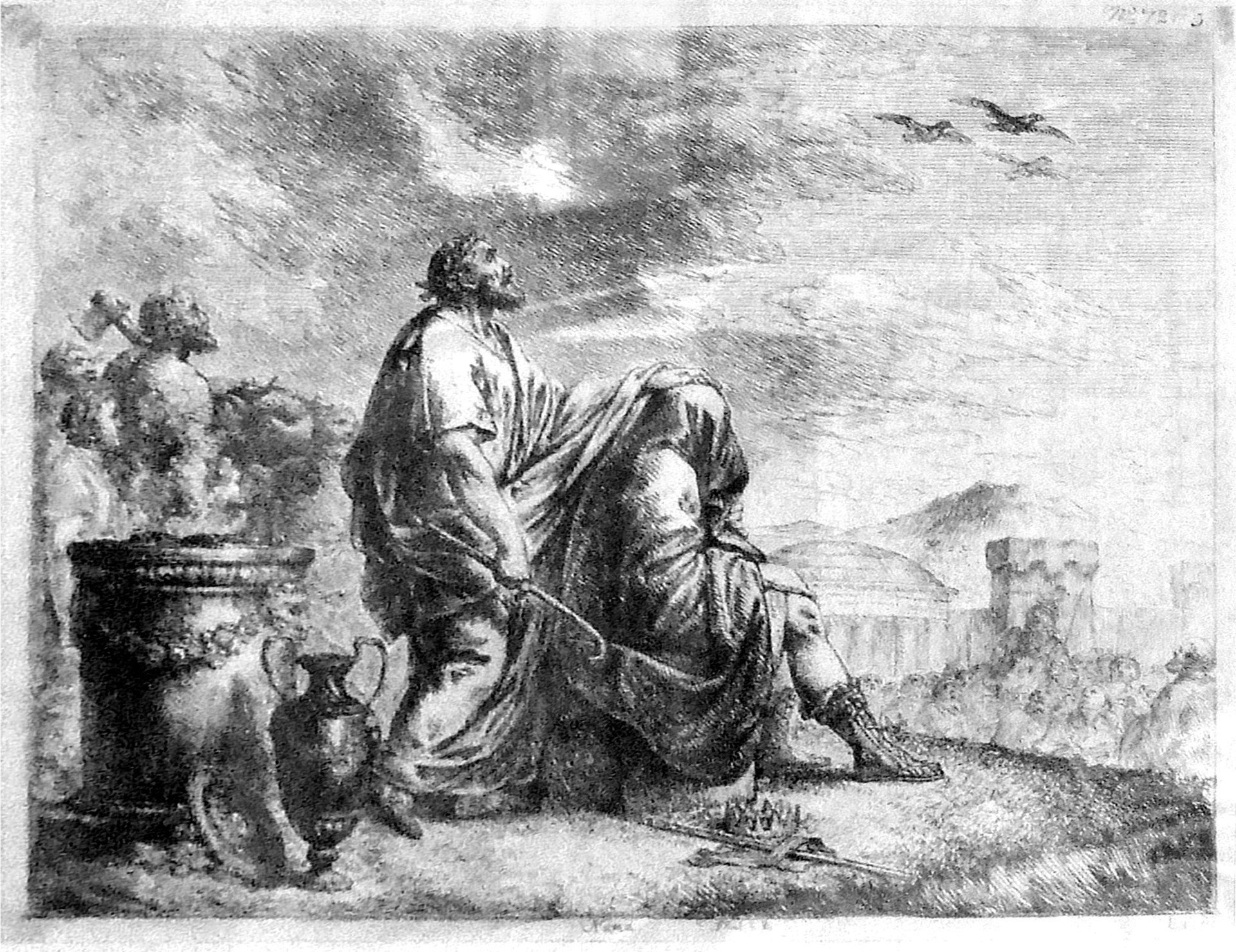
Now the leader of the Sabines was a man named Curtius. This man exclaimed to his comrades, “Look, we have conquered these men, false armies and weak enemies that they are! Now they know for sure that it is one thing to kidnap girls and another to fight with men.” But as he boasted, King Romulus and a group of young men rushed towards him. Curtius fought on horseback, and when he was attacked, he fled and plunged into a pool that lay between the Palatine Hill and the Capitoline.
Thus he narrowly escaped death, and the lake was thereafter called the “Curtian Pool”. And now the Sabines made way for the Romans, when suddenly the women for whom they were fighting, with their hair loose and their clothes torn, ran among them, crying out, “Do not shed each other’s blood, they are fathers-in-law and sons-in-law of each other. But if you break this bond, then kill us too, who are the cause of these troubles. It would certainly be better for us to die than to live if we are robbed of our fathers or our husbands.” With these words, they moved the hearts of both the leaders and the people, so that suddenly a great silence fell.
Then the leaders came forward to make a covenant. Matters were settled so that there was not only peace, but also one state where there had been two. For the Sabines came to Rome and lived there, and King Romulus and King Tatius ruled together. Only after a while, men from Lavinium killed King Tatius while he was offering sacrifice to the gods in Lavinium. After that, only Romulus was king, as before.
When he had reigned for thirty-seven years, something happened. On a certain day, he called the people together on the field of Mars with the intention of inspecting his army. But while he did this, suddenly a great storm arose with loud thunderclaps and very thick clouds, so that the king was hidden from the eyes of the entire people. And he was never seen on earth again.
So now it was necessary to choose a new king. In those days, no one was known for his righteousness and piety more than a certain Numa Pompilius, who lived in Cures in the land of the Sabines. At first, the senate thought that the Sabines would be too powerful if the king were chosen from their midst, but since they could not agree on any other man, they eventually decided unanimously to offer the kingdom to Numa.
Numa was willing to accept it if the gods consented. So permission was sought from the gods. Led by the Priest to the citadel, he sat on a stone with his face to the south. The Priest sat to his left with his head covered and a knobless staff in his hand. Then he looked at the city and the land around it, prayed to the gods, marked the area of the sky from sunrise to sunset, called the parts to the south right, and those to the north left, and set a boundary as far as his eye could see.
Then he took his staff in his left hand and placed his right hand on Numa’s head, praying with these words: “Father Jupiter, if it is your will that this Numa Pompilius, whose head I hold, should be king of Rome, I pray to you to show us clear signs of your will within the space that I have marked out.” When the signs were shown, Numa was proclaimed king.
King Numa put many things in order for his people. First, he divided the year into twelve months, with each month corresponding to the moon’s cycle, and every twenty-fourth year having an extra month, so that the year would correspond to the sun’s cycle. He also established certain legal days for business, and other days on which nothing could be done.
He also appointed priests, of whom the head was the priest of Jupiter, to whom he gave magnificent clothing and an ivory chair. He appointed two others as priests of Mars and Quirinus. He also chose maidens for the service of Vesta, who were to keep the sacred fire alive, and twelve other priests whom he called the Salii, to be guardians of the sacred shield. The people said that this shield fell from the sky, and to keep it even more secure, King Numa ordered that they should make eleven other shields like it. These shields were to be carried by the Salii through the city, wearing flowered tunics and copper breastplates, while they danced and sang hymns.
And King Numa brought many other things in order concerning the worship of the gods, and the reading of signs, and the handling of miracles and omens. And so that the people would regard these laws and customs with even more reverence, he admitted that he did not conceive of them with his own mind, but that he had learned them from a certain goddess whose name was Egeria, whom he used to meet in a forest outside the city.
King Numa died, having reigned for forty-three years, and the people then chose Tullus Hostilius as king in his place.

